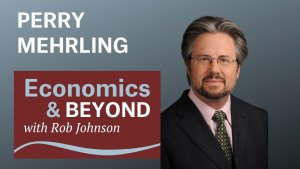I first encountered Mr. Soros and his theory of reflexivity back in the spring of 1987 when he visited The Brookings Institution to talk about his book The Alchemy of Finance. I was there on a Dissertation Fellowship, working on a set of papers I called “Toward a Credit Theory of Money”. Because of my topic, I was interested in what Mr. Soros had to say. But I was also unprepared to take it all in since I knew very little finance, and anyway I was trying to finish the dissertation not to launch out in a new direction. So I missed that opportunity, and consequently I am grateful for a second chance today, some 25 years later, to engage with Mr. Soros’ newest thinking.
Mr. Soros accuses economists of a fundamental mistake, two mistakes really, 1) a mistaken conception of the object they are studying which has led them to, 2) a mistaken method for studying it. Let us stipulate that Mr. Soros is right about that. The next question, to my mind, is: Why are economists so wedded to these fundamental mistakes and so resistant to correction? I’m sure there are many reasons—the usual accompaniments of human endeavor, hubris, status, power—but the theory of Mr. Soros suggests to me one additional candidate explanation.
Mr. Soros has referred to the European Union as a fantastical object.
I want to propose right here at the beginning of the conference that we seriously consider the possibility that intertemporal general equilibrium functions for economists as a “fantastical object”.
Observers of economics easily miss this, focusing instead on the fights between those who think government intervention is the solution and those who think government intervention is the problem. But typically both sides of this fight have vividly in front of them the very same fantastical object; they are fighting about how best to make that fantastical object a present reality, but they are in agreement about resisting Mr. Soros’ attempts to get them to let go of their fantastical object.
David Tuckett teaches us that fantastical objects play a key role in the way fund managers handle their jobs, which require them to make myriad consequential decisions under conditions of radical uncertainty. But the situation of the fund manager is just a more extreme version of the situation we all face. We all try to figure out how the world works, but inevitably we have imperfect knowledge. And no matter how hard we try, our understanding of the world never quite catches up with where the world actually is, and sometimes our understanding can fall quite far behind. Why is this? Why is our knowledge inevitably imperfect?
One reason is that the world is rapidly evolving—institutional evolution and technological change routinely transform the world outside our window. Every ten years or so, something becomes routine that only ten years before was on no one’s radar screen as even a possibility.
Another reason is that the world is complex, with many moving parts that interact in ways that it is hard for anyone, or even for any supercomputer, to predict in advance.
Mr. Soros himself emphasizes yet a third reason, that the deliberate actions we take, based on our understanding of the world, actually change the world outside our window. I don’t suppose he is talking about people like me, a simple professor slaving away in the archives. I suppose he is talking about people like many of you, men and women of affairs, in business or politics, whose decisions directly change the world.
This is an important distinction, I think, and perhaps a direction in which Mr. Soros might develop his theory further, because it links up with another one of his fundamental themes, the inherent instability of credit.
The point is this. We all face the same existential situation, the necessity to act under conditions of radical uncertainty, and we all grab on to fantastical objects for succor as we do so. But some of us, some few of us, have the opportunity to make our fantastical objects a reality, or anyway to try by our actions to do so. Great wealth or great power provide that opportunity, but so does credit.
Everyone has a vision of a possible future, but those with credit have the opportunity to build out a little piece of their imagined future in the actual present. And in this way, they have an opportunity to actually create the future they only imagine, or anyway to try it out. And for other people watching, this credit-financed “trying out” amounts to actual evidence, concrete present evidence, in favor of a particular vision of the future. In this way, one man’s fantastical object becomes another man’s fantastical object, and if the second man also has credit, he too has an opportunity to build out a little piece of the now-shared vision, and—hey presto—more evidence that the fantastical object is a plausible candidate for future reality. That’s how bubbles get started.
But the more fundamental point is this. The interlocking structure of credit is a bridge that we build from the present out into the unknown future, from the present shore out over the void toward shores only imagined. The credit system privileges some visions of the future over others; that’s how the bridge gets started on one direction rather than another, but there is always a bridge.
And there is always a reality check—what Hyman Minsky called the “survival constraint”. Credit is a promise made; the reality check comes when the promise comes due, when it becomes clear that reality is in important respects not aligned with the fantastical object. The failure, or necessitous extension, of one promise calls into doubt all the others based on the same fantastical object, and the whole structure threatens to collapse.
I say that it threatens to collapse, because when you are dealing with credit, you are dealing also with banks and central banks, which can themselves extend promises not kept, or even cancel them. For a while, maybe, banks practice forbearance because they genuinely believe in the prospect that led them to make the loans in the first place. But at a crucial point, they switch to a different fantastical object, the prospect of catastrophic cascading default, a prospect which can be avoided only by strong and forthright action in the present, not by themselves but by their own banker, the central bank. Lender of last resort, dealer of last resort, and outright bailout becomes the order of the day. Liquidation is delayed, and in the meanwhile maybe something turns up.
But though fear of collapse may be enough to prompt action to prevent collapse, expansion cannot be reignited until a new positive fantastical object has a chance to take hold, and we start again to build our next fantastical bridge, out over the void into the future.
*****
Mr. Soros is concerned about Europe, and he suggests that the road forward involves recommitment to the old fantastical object, the European Union as the embodiment of open society. But Mr. Soros is also concerned about economics, and there he suggests that the road forward involves rejection of the old fantastical object, and commitment to an open-ended exploration of new economic thinking. Probably most economists, present company excepted, take exactly the opposite view, preferring to give up on the dream of Europe and recommit to the dream of intertemporal equilibrium.
So that’s where we are as we come together today, exquisitely poised between the known but discredited fantastical objects of the past and unknown fantastical objects of the future. For me, that’s what this conference is all about. It is about considering which fantastical objects we will choose to help us on the next stage of our journey, and which we will leave behind as so much dead weight. Multiple possible futures spread out before us, no one knows which is the one that will actually happen, but nonetheless we have to act, we have to place our bets.





